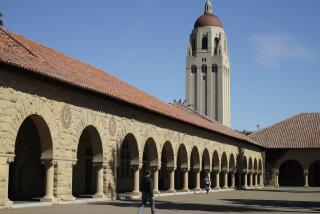Indian Activists Critical of UC Plan for Return of Bones : Anthropology: Remains would be given only to those able to trace biological or cultural links to ancestors.
- Share via
Skeletal remains of American Indians in the University of California’s anthropology collections should be given to descendants for possible reburial only if biological lineage or cultural ties can be proved, a UC-appointed panel of experts recommended Monday.
The conclusions were denounced by some Indian activists and a state assemblyman as giving UC too much control over other people’s heritage.
The UC report is the latest development in the national debate over whether American Indians’ concerns about unburied skeletons are more important than the research value of keeping the bones in museums and laboratories. Stanford University and the Smithsonian Institution decided last year to hand over parts of their collections to tribes under guidelines generally similar to the UC recommendations.
“The sensibilities of living people may in some instances take precedence” over research, said the 13-member UC committee appointed in May by UC President David P. Gardner. The report also contends that the remains are being used ethically in UC medical and anthropological studies and that the bones and other artifacts should be given away under strict guidelines.
It is now up to Gardner for a final decision on the UC collections. The largest is at UC Berkeley’s Lowie Museum of Anthropology, which has the remains of about 8,000 American Indians and about 2,000 remains from elsewhere in the world. UCLA’s Fowler Museum of Cultural History has bones of about 1,300 people, primarily from California; the Davis, Santa Barbara and Santa Cruz campuses have much smaller collections.
Assemblyman Richard Katz (D-Sylmar) and Indian leaders held a press conference Monday to criticize the UC report and call for passage of a Katz-authored bill that would give much say over skeletal remains in California museums and universities to the Native American Heritage Commission, a state agency. The commission already has power to determine the likely descendants of remains exhumed since 1982. Katz’s bill, which passed the Assembly in June and is awaiting Senate action, would extend the rule to any bones dug up before 1982.
“The University of California is putting its rights to possess and study the remains ahead of Native American rights to bury their ancestors according to their traditions and beliefs,” said Katz, adding that it would be a conflict of interest for UC to determine the fate of the bones. The briefing was held at the Forest Lawn cemetery in the Hollywood Hills, a peaceful spot chosen to contrast with what were said to be desecrated burial grounds of American Indians.
The UC Committee on Human Skeletal Remains said the university should try to identify and notify living descendants who might want the bones and artifacts. When direct family ties cannot be shown, UC should give away remains case by case to tribes only if “specific and direct biological continuity” or “social/cultural linkage (as conditioned in some instances by geography)” is demonstrated, the panel said.
Christopher Donnan, director of the UCLA collection, said the overwhelming majority of the remains there and at Berkeley are prehistoric, dating from long before the settlement patterns of current tribes were established. He predicted that only a very small number would be given for reburial if the committee’s ideas are adopted. “The big problem we face is trying to track down who would be descendants if you have somebody from 5,000 years ago,” Donnan said Monday.
Committee Chairman Robert S. Michaelsen, who is a professor emeritus of religious studies at UC Santa Barbara and an expert on American Indian religions, said his panel wanted to keep the decisions within UC as much as possible. “I think there is confidence the university has the capacity to handle most cases fairly,” he said.
Other committee members were Jo Allyn Archambault, director of the American Indian program at the Smithsonian; Reginald Alleyne, UCLA law professor; Lynne Goldstein, secretary of the Society for American Archaeology; R. Ervin Taylor, UC Riverside anthropology professor; Rose A. Tyson, physical anthropology curator at the San Diego Museum of Man, and Clifton Poodry, UC Santa Cruz biology professor. Five of the 13 were said to have at least some American Indian bloodlines.
More to Read
Sign up for Essential California
The most important California stories and recommendations in your inbox every morning.
You may occasionally receive promotional content from the Los Angeles Times.














